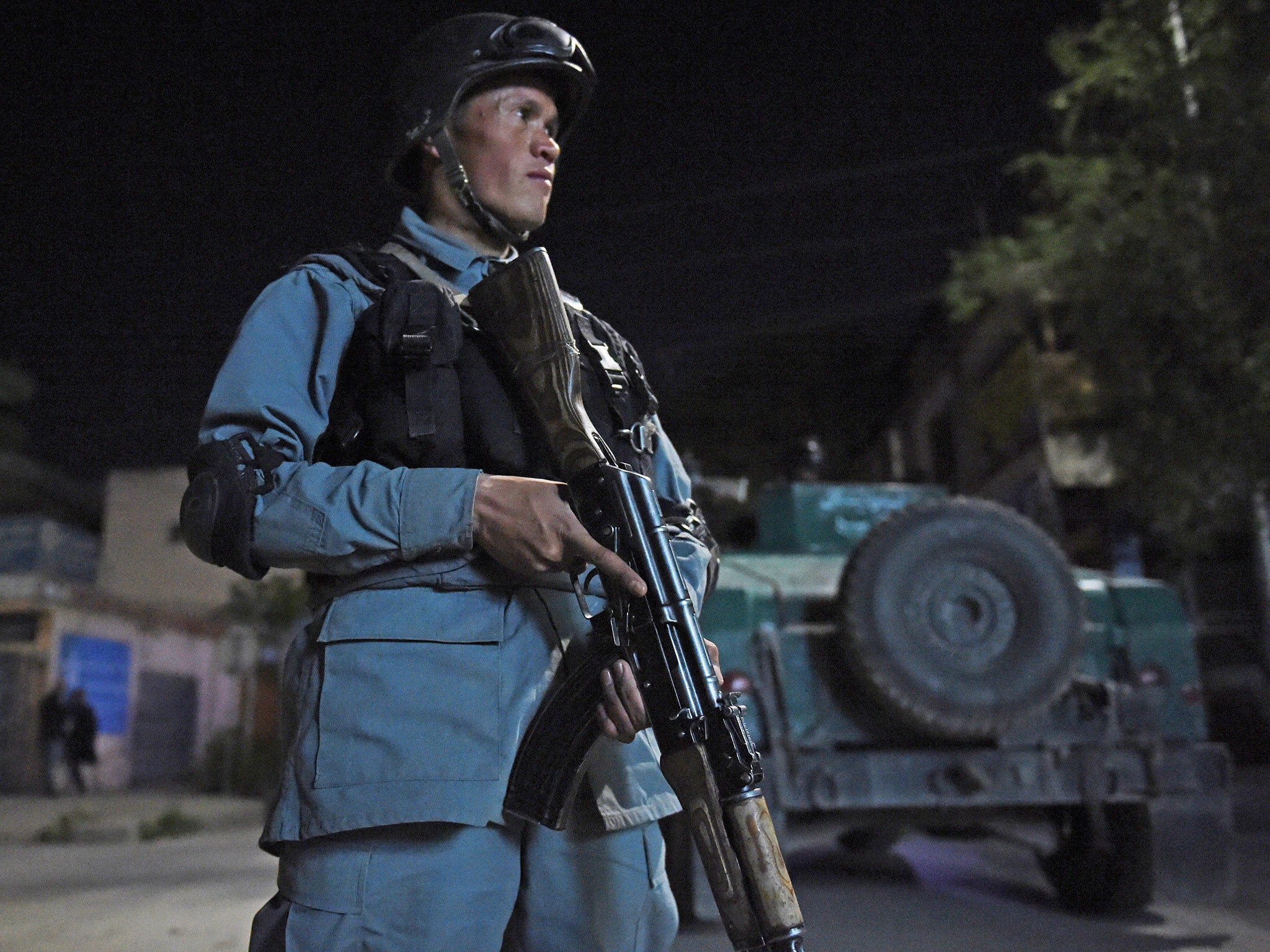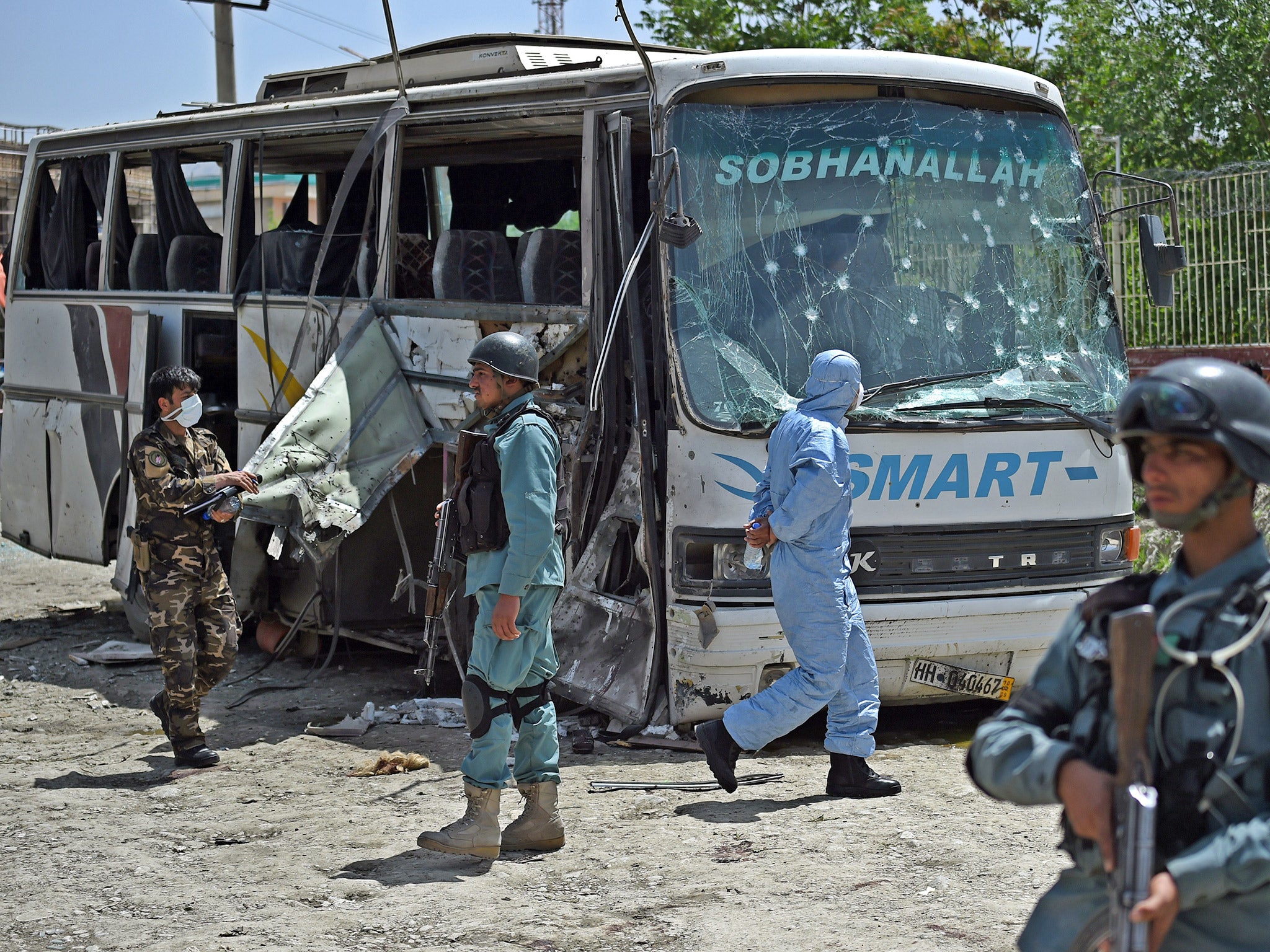Afghanistan peace talks: Taliban flexes its muscles with deadly spate of attacks ahead of meeting with government officials
Kabul bombings and shootings designed to create climate of fear and show militants are still strong, say analysts

Your support helps us to tell the story
From reproductive rights to climate change to Big Tech, The Independent is on the ground when the story is developing. Whether it's investigating the financials of Elon Musk's pro-Trump PAC or producing our latest documentary, 'The A Word', which shines a light on the American women fighting for reproductive rights, we know how important it is to parse out the facts from the messaging.
At such a critical moment in US history, we need reporters on the ground. Your donation allows us to keep sending journalists to speak to both sides of the story.
The Independent is trusted by Americans across the entire political spectrum. And unlike many other quality news outlets, we choose not to lock Americans out of our reporting and analysis with paywalls. We believe quality journalism should be available to everyone, paid for by those who can afford it.
Your support makes all the difference.A lone Afghan policeman stands guard at the gate of Kabul’s Park Palace guesthouse. Inside, workers clean up broken crockery, glasses, overturned chairs, spent shells and puddles of blood.
A week ago guests were arriving to hear the renowned Afghan classical singer Eltaf Hussain Sarahang when a Taliban militant opened indiscriminate fire from a Kalashnikov assault rifle and pistol, killing 14 people gathered in the garden.
Since then, there have been three more attacks in Kabul, and a fourth today when a car bomb exploded outside the Ministry of Justice as civil servants were due to leave work. As least six died. Before that, on Sunday morning, another suicide bomber attacked Kabul’s international airport, killing two children and a British security worker.
The series of attacks in the heart of the Afghan capital have punctured hopes of an early end to the deadlock in the peace process. Expectations were running high in the country after representatives of President Ashraf Ghani held an informal meeting with Taliban militants in the Gulf state of Qatar this month. The meeting was believed to be a prescursor to formal peace talks between the two sides.
Jawed Kohistani, a former senior intelligence operative with the National Directorate of Security, Afghanistan’s intelligence agency, said the attacks signal that the Taliban will try to drive a hard bargain at the talks, if and when they happen. “The attacks are aimed to show that they are still powerful and they want to talk from a position of strength,” Mr Kohistani told The Independent. “The attacks are aimed at creating a climate of fear.”

Haroun Mir, an independent political analyst, said that the Taliban’s objective is to prove it is still strong and could attack areas under the government control anywhere in the country. “They want to create popular resentment vis-a-vis the government, and thus weaken the government and not allow it to achieve what the President has promised in terms of reform and improvement in the governing system,” he said. “The political situation has remained uncertain, the economy has been worsening day by day and the government now must dedicate its scarce resources to security at the detriment of other important pending issues. This, to me, is an important tactical achievement for the Taliban.”
Amar Sinha, the Indian ambassador to Afghanistan, was due to attend the concert at the Park Palace guesthouse a week ago. “That day it appears the main target were Afghans and Indians. India is perhaps the only non-combatant country in Afghanistan that has lost so many civilian lives. These attacks have happened to stop all developmental projects that we do here.
“We lost nearly a dozen Indians while constructing the Zaranj Delaram road and threats are issued against other projects. The very idea behind such terror attacks is to frighten the international community so that they pack their bags and leave. That is not happening. Fear is very ephemeral. Even if people postpone their business plans for some time, the long-term prospect will not dim.”
Mr Mir says the government is fast losing the political capital it had earned on the formation of the national unity government (NUG). “We see more and more people becoming critical of NUG. By the time they enter serious political negotiations, the government might lack the necessary political support, which could hurt its legitimacy and, thus, its bargaining position.”
Graeme Smith, senior analyst with the International Crisis Group, said the rising level of violence has put Mr Ghani, a proponent of peace talks with the Taliban, in a difficult position. “The team around President Ghani seems determined to push forward with peace talks despite the rising violence, but some of his partners in the unity government, especially northern politicians, are less comfortable with the process,” Mr Smith said. “Ghani will need to negotiate on two fronts – encouraging the Taliban to put down their weapons, while at the same time preventing northern commanders from taking up arms.”
According to one senior Kabul-based strategic-affairs analyst, the recent attacks signal that Inter-Services Intelligence, Pakistan’s military spy agency, is losing influence over the Taliban. “The Taliban leadership seems to be on its own now. It is not listening to ISI as it used to earlier,” he said, requesting anonymity. “And this is not a good sign.”
Afghan security officials often accuse the ISI of funding and directing the Taliban violence, a charge strongly rebutted by the Pakistani government.
“Pakistan may not have total control over Taliban,” Mr Kohistani said.
Mob killing: Police sentenced
An Afghan judge has sentenced 11 policemen to one year in prison for dereliction of duty during the mob killing of a woman in Kabul, who was falsely accused of burning a Koran.
Judge Safiullah Mojadedi released another eight officers due to lack of evidence. The policemen were among 49 people charged over the killing of 27-year-old Farkhunda in March. The attack sparked protests in Afghanistan.
Earlier this month, four defendants were sentenced to death and eight to 16 years in prison. A further 18 people were freed due to lack of evidence.
AP
Join our commenting forum
Join thought-provoking conversations, follow other Independent readers and see their replies
Comments